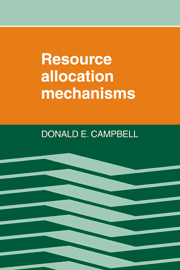Book contents
- Frontmatter
- Contents
- Preface
- Chapter 1 Introduction
- Chapter 2 Performance criteria
- Chapter 3 The Arrow–Debreu world
- Chapter 4 Uncertainty
- Chapter 5 Incentive compatibility
- Chapter 6 Existence of a competitive equilibrium
- Chapter 7 Welfare properties of the Walrasian mechanism
- Appendix 1 Elements of consumer choice
- Appendix 2 The Edgeworth exchange economy
- Appendix 3 Proof of the Shafer–Sonnenschein theorem
- References
- Author index
- Subject index
Appendix 1 - Elements of consumer choice
Published online by Cambridge University Press: 05 June 2012
- Frontmatter
- Contents
- Preface
- Chapter 1 Introduction
- Chapter 2 Performance criteria
- Chapter 3 The Arrow–Debreu world
- Chapter 4 Uncertainty
- Chapter 5 Incentive compatibility
- Chapter 6 Existence of a competitive equilibrium
- Chapter 7 Welfare properties of the Walrasian mechanism
- Appendix 1 Elements of consumer choice
- Appendix 2 The Edgeworth exchange economy
- Appendix 3 Proof of the Shafer–Sonnenschein theorem
- References
- Author index
- Subject index
Summary
This chapter is concerned exclusively with individual choice. Let X be the universal set of alternatives. We wish to represent the individual's preferences in such a way that his choice from a subset B of X can be obtained from that representation. We begin with choice over two-element sets and build from there.
Definition: A binary relation Q on X is a subset of X × X. If (x, y) belongs to Q, we write xQy, Relation Q is complete if, for all x, y ∈ X, either xQy or yQx holds; Q is transitive if, for all x, y, z ∈ X, xQy and yQz imply xQz. A complete and transitive binary relation is called a weak order and is represented by the letter R.
Since R is complete, we have xRx (set y = x). Since x cannot be strictly preferred to itself, the statement xRy must mean that x is at least as desirable as y: It may be that x is equally desirable as y as in the case y = x, or that x is strictly preferred to y. We can be sure that y is not strictly preferred to x if xRy holds.
If x belongs to B and xRy for all y ∈ B, then x belongs to the set of best (or most-preferred) elements in B. A weak order allows us to determine choice on any finite set from choice on two-element sets.
Information
- Type
- Chapter
- Information
- Resource Allocation Mechanisms , pp. 156 - 165Publisher: Cambridge University PressPrint publication year: 1987
